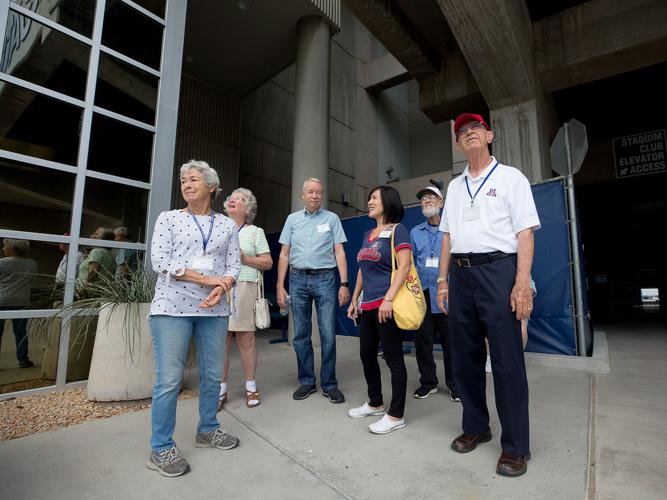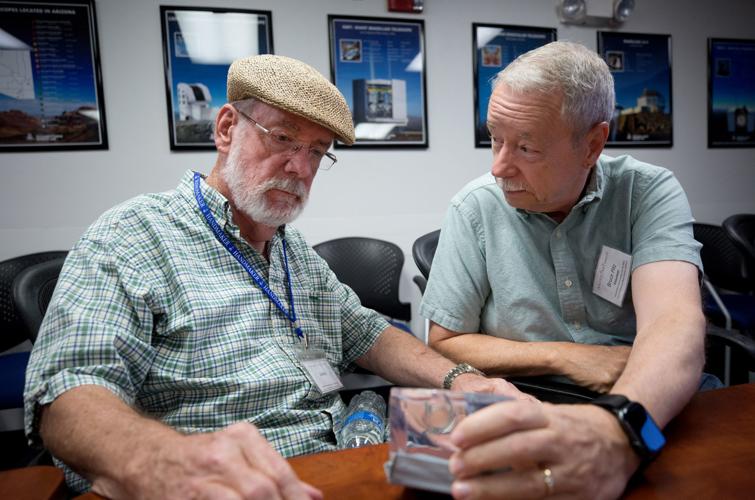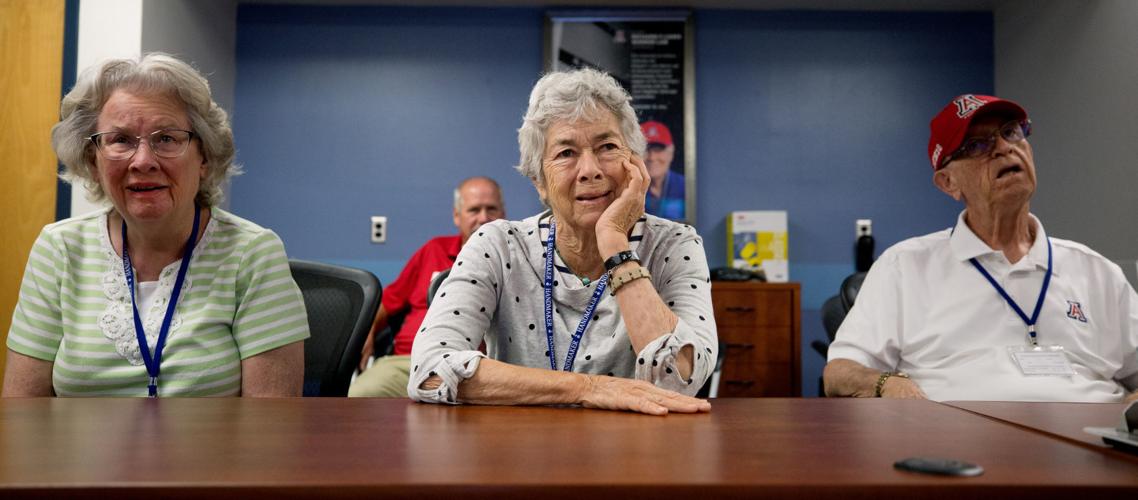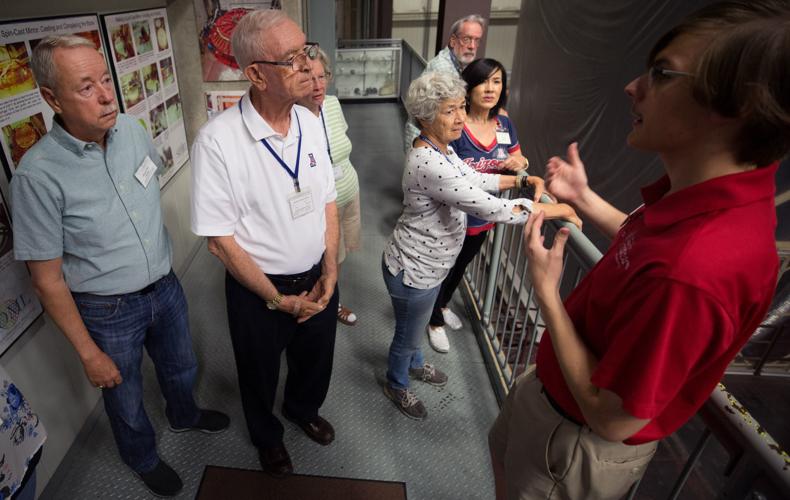Tom Shelby smiled while he waited to get on board the Adventure Bus — excited about heading to the University of Arizona’s mirror laboratory.
He raised his arms and let out a “yahoo” while the other participants in the summer program’s weekly excursions joined him in laughter.
Shelby and the others enrolled in Adventure Bus are taking part in the program targeting people in the early to middle stages of Alzheimer’s disease or dementia who live at home.
“The program provides respite for family caregivers and stimulation, education, recreation and socialization for participants,” explained Angela Salmon, Adventure Bus and development coordinator for the nonprofit Handmaker Jewish Services for the Aging.
Salmon said the outreach program “helps to slow down cognitive decline because activities keep participants mentally and socially active.”
Daily activity and exercise are important for those diagnosed with dementia because it is beneficial to their physical health, helps with sleep and improves their mobility, according to experts.
Shelby is a retired lawyer and bank trust officer who was diagnosed with Alzheimer’s in 2014. The 76-year-old is in good spirits and cordial.
Alzheimer’s disease — a progressive, irreversible disorder and the most common form of dementia — develops when brain cells stop functioning and eventually die. The disease affects parts of the brain that involve thinking, remembering and using language. It can ruthlessly impede a person’s ability to carry out daily activities. There is no cure.
Lab tour, then lunch
As participants were dropped off by their loved ones at Handmaker, 2221 N. Rosemont Blvd., they met with Salmon in the lobby of the assisted living, skilled nursing and memory care facility.
Salmon greeted the men and women with a smile, a handshake and a hug. She gathered a cooler filled with water and snacks and all boarded the van to head to the Richard F. Caris Mirror Lab at the UA.
Among the participants accompanying Shelby were Margaret Gates, 82, who moved from San Antonio to Tucson to be with family after traveling the country showing her English springer spaniels in shows. She said she attended the Westminster Kennel Club Dog Show at New York’s Madison Square Garden numerous times.
Also in attendance was Jackie Sullivan, 73, a retired massage therapist and yoga instructor. She recently returned from a cross-country motorcycle trip with her husband.
The participants listened to lab tour guide Will Clodfelder as he explained the process in the production of “the largest and most complex telescope mirrors in the world” originating at the lab near the UA football stadium.
The UA produces ultra lightweight mirrors that weigh 20 tons, compared with heavyweight mirrors that weighed 140 tons. Presently, scientists and staff are manufacturing mirrors for the Giant Magellan Telescope in Chile, said Clodfelder.
The mirror-casting process takes 100 days, and to make a mirror from casting to grinding to polishing can take five to six years. Thousands of tiny diamonds are used in the polishing compounds. It costs about $25 million for each mirror panel.
The maximum number of participants on the Adventure Bus in each session is eight. “We like to keep it intimate,” said Salmon. “It allows them to be open. They are able to share and connect with one another,” she said.
“I like how they showed us the process in making the mirrors, and all that goes into it,” said Shelby, wearing a red ball cap, a white shirt with UA logos and dark pants.
After the tour, members boarded the bus and headed to Caruso’s restaurant on North Fourth Avenue for a lunch including dishes of pasta with chicken or shrimp, meatballs, antipasto salad, soup, toasted buttered bread and iced teas.
Then the group continued on the Adventure Bus for a tour of the Arizona History Museum, 949 E. Second St. Jaynie Adams, museum education curator, guided the group through exhibits, including those of early cowboys, ranch owners, miners and lawmen.
One exhibit was of a 1923 Studebaker used by Pima County Sheriff Walter Bailey. The automobile cost $1,575. The automobile company discovered that 12 of the 14 Arizona counties provided their sheriffs with Studebakers. The company gathered stories of the cars used in the “capture of bank robbers, killers, bootleggers, and horse thieves,” read an exhibit.
“I like the tours because they are done so well by Angela. We learn and see a lot, and I like the small groups because we get to know each other,” said Shelby of Adventure Bus, which made its way back to Handmaker, where the participants were picked up by family in the afternoon.
Gail Shelby said she enrolled her husband, Tom, in the program three years ago after hearing about it through an Alzheimer’s support group.
“They do different activities and stay active. Tom likes going out and being social,” said Gail. While he is in the program, she uses her free time to run errands and go to appointments.
She said having respite is necessary because constant caregiving wears her down, adding that she is fortunate because Tom is covered by private long-term-care health insurance, which reimburses the costs.
She retired in 2014 as a medical technologist because she realized Tom could not be left alone for long periods of time. He is a wanderer and has walked away from home four times. He was found by neighbors and each time returned home safe, said Gail, who explained the situation to friends in the neighborhood.
The couple, who are originally from South Dakota, moved from Sioux Falls to Tucson in 1985 with their three children, Tom becoming vice president and manager of the trust department at the former Bank of Arizona at the Catalina Foothills location. He retired in 2008. They have eight grandchildren and they all gather for family dinners, celebrations and holidays.
These interactions are important to the close-knit family and to Tom’s health, said Gail, explaining that Tom’s parents both had dementia. He also is close to friends who take him to activities at the Old Pueblo Rotary Club, Knights of Columbus at St. Thomas the Apostle Catholic Church and the Elks Lodge No. 385.
Tom no longer drives, which Gail said was a difficult adjustment for the couple.
Gatherings bring joy
Volunteer Bruce Pitz has worked with Salmon on Adventure Bus for five years.
“I get so much out of this, working with people who have dementia or Alzheimer’s. My mother and my mother-in-law both had dementia. It is something that is very close to my heart,” said Pitz a retired assistant office manager for a medical billing company.
He said he receives joy from the weekly gatherings, seeing the bonding and friendships created among the participants. The respite is an important time for caregivers who “do not have to worry about their loved ones.”
Adventure Bus was launched at Handmaker in 2011 with a donation from Adrienne Drell and her husband, Frank Nitikman. The couple talked to Jewish Federation officials about the concept from a program in Chicago that Nitikman, who was diagnosed with dementia, took part in, said Salmon.
The program is dedicated to Nitikman’s parents, David and Janette Nitikman, who lived their last days at Handmaker, Salmon said.







